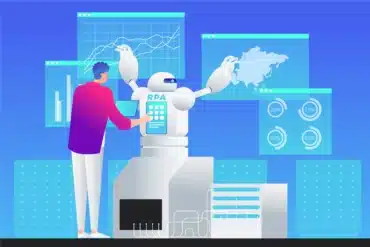By Ubaid Syed
Unveiling the Future of Software Development: Trends and Predictions for 2024 and Beyond
Introduction
As the brink of a new era in technology is approached, the landscape of future of software development is poised for remarkable transformation. From advancements in artificial intelligence to the widespread adoption of low-code development, the opportunities for innovation are boundless.
Opportunities for Growth in Low-Code Development:
Firstly, low-code development platforms are transforming software creation, enabling developers to build applications with minimal coding effort. As businesses aim to speed up their digital transformation efforts, the demand for low-code development is anticipated to rise significantly. With its promise of faster time-to-market and increased productivity, low-code development presents significant opportunities for growth in the software industry.
Increasing Growth in Remote Work:
Moreover, the COVID-19 pandemic has accelerated the adoption of remote work, transforming the way teams collaborate and communicate. As remote work becomes the new norm, software developers are leveraging collaboration tools and remote-friendly technologies to facilitate seamless workflows. The future of software development will see a continued emphasis on remote work practices, enabling teams to work efficiently from anywhere in the world.
Era of Cloud Computing in the Future of Software Development:
Furthermore, cloud computing has become the backbone of modern software development, offering scalability, flexibility, and cost-effectiveness. In the future, we can expect to see even greater reliance on cloud technologies, with businesses leveraging cloud platforms for hosting, storage, and computing resources. The rise of cloud-native architectures and serverless computing will further drive innovation in the software development landscape.
Advancement in Artificial Intelligence and Machine Learning:
Additionally, artificial intelligence and machine learning are poised to revolutionize every aspect of software development, from automated testing and code generation to predictive analytics and personalized user experiences. As AI and ML technologies continue to advance, we can expect to see greater integration of intelligent features and automation capabilities in software applications.
Impact of IoT Solutions in the Future of Software Development:
Furthermore, the Internet of Things (IoT) is reshaping industries and driving new opportunities for software development. From smart homes and connected devices to industrial IoT applications, the proliferation of IoT solutions will create a demand for specialized software development skills. The future of software development will see a focus on building robust, scalable, and secure IoT applications to harness the power of connected devices.
Blockchain-Based Security in the Future of Software Development:
Blockchain technology is also disrupting traditional notions of security and trust, offering decentralized and tamper-proof solutions for data integrity and authentication. In the future, we can expect to see greater adoption of blockchain-based security solutions in software development, particularly in industries such as finance, healthcare, and supply chain management.
Wide Use of PWA in the Future of Software Development:
Additionally, Progressive Web Apps (PWAs) are poised to become the preferred choice for building cross-platform web applications that offer native-like experiences. With features such as offline functionality, push notifications, and fast performance, PWAs provide a compelling alternative to traditional native apps. In the future, we can expect to see a wide adoption of PWAs as businesses seek to deliver engaging and responsive web experiences to their users.
Need for Implementation of Cybersecurity:
With the increasing sophistication of cyber threats, cybersecurity has never been more critical in software development. As software applications become more interconnected and data-driven, the need for robust cybersecurity measures will continue to grow. In the future, software developers will need to prioritize security from the outset, implementing best practices and technologies to safeguard sensitive data and protect against cyber attacks.
Application of Deep Learning Libraries:
Moreover, deep learning libraries such as TensorFlow and PyTorch are empowering developers to build complex neural networks and AI models with ease. In the future, we can expect to see greater utilization of deep learning libraries in software development, enabling developers to create advanced AI-driven applications with minimal effort. From image recognition and natural language processing to recommendation systems and autonomous vehicles, deep learning will play a central role in shaping the future of software development.
Prevalent Use of Multi-Model and Multi-Purpose Databases:
Furthermore, traditional relational databases are giving way to multi-model and multi-purpose databases that offer greater flexibility and scalability. In the future, we can expect to see a widespread adoption of these databases in software development, allowing developers to store and manage diverse data types more efficiently.
API Technology in the Mainstream:
Lastly, Application Programming Interfaces (APIs) are the building blocks of modern software applications, enabling seamless integration and interoperability between different systems and services. In the future, we can expect to see API technology become even more pervasive, with businesses leveraging APIs to unlock new opportunities for innovation and collaboration. From microservices architectures to third-party integrations, APIs will continue to play a central role in driving the future of software development.
Conclusion
In conclusion, as we look ahead to the future of software development in 2024 and beyond, it’s clear that we are on the cusp of an exciting era of innovation and transformation. By embracing these trends and staying ahead of the curve, businesses can unlock new opportunities for growth, efficiency, and competitiveness in the digital age. The journey ahead may be challenging, but with the right strategies and mindset, the opportunities for growth and advancement are limitless.







